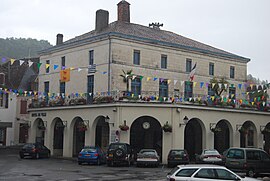Loading AI tools
Salies-de-Béarn
Commune in Nouvelle-Aquitaine, France From Wikipedia, the free encyclopedia
Salies-de-Béarn (French pronunciation: [salis də beaʁn], literally Salies of Béarn; Occitan: Salias) is a commune in the Pyrénées-Atlantiques department in south-western France.[3]
You can help expand this article with text translated from the corresponding article in French. (December 2008) Click [show] for important translation instructions.
|
Salies-de-Béarn | |
|---|---|
 Town Hall | |
| Coordinates: 43°28′16″N 0°55′30″W | |
| Country | France |
| Region | Nouvelle-Aquitaine |
| Department | Pyrénées-Atlantiques |
| Arrondissement | Oloron-Sainte-Marie |
| Canton | Orthez et Terres des Gaves et du Sel |
| Government | |
| • Mayor (2020–2026) | Thierry Cabanne[1] |
| Area 1 | 52.08 km2 (20.11 sq mi) |
| Population (2021)[2] | 4,545 |
| • Density | 87/km2 (230/sq mi) |
| Time zone | UTC+01:00 (CET) |
| • Summer (DST) | UTC+02:00 (CEST) |
| INSEE/Postal code | 64499 /64270 |
| Elevation | 28–202 m (92–663 ft) (avg. 56 m or 184 ft) |
| 1 French Land Register data, which excludes lakes, ponds, glaciers > 1 km2 (0.386 sq mi or 247 acres) and river estuaries. | |
The name comes from its naturally occurring saline water (Gascon salias for Standard Occitan salinas). During the expanded, pre-liberation occupation of France by Nazi Germany, Salies was on the border between the occupied zone and the free zone.
Between September 1941 and the summer of 1942, Jean Anouilh wrote his famous adaptation of Sophocles' tragedy, Antigone in the comparatively idyllic setting of Salies-de-Béarn, relieved of the invader's presence, the evening curfews and the deprivations of Paris. The play premiered in Occupied Paris in February 1944.
Salies-de-Béarn served as the setting for the writer Trevanian's novel, The Summer of Katya. In the book, it was renamed Salies-les-Bains.
An account of living and working in Salies-de-Béarn in the late sixties is given by Clive Jackson in his book Footloose in France.[4]
| Year | Pop. | ±% p.a. |
|---|---|---|
| 1968 | 5,582 | — |
| 1975 | 5,355 | −0.59% |
| 1982 | 4,957 | −1.10% |
| 1990 | 4,974 | +0.04% |
| 1999 | 4,759 | −0.49% |
| 2007 | 4,803 | +0.12% |
| 2012 | 4,854 | +0.21% |
| 2017 | 4,638 | −0.91% |
| Source: INSEE[5] | ||
Seamless Wikipedia browsing. On steroids.
Every time you click a link to Wikipedia, Wiktionary or Wikiquote in your browser's search results, it will show the modern Wikiwand interface.
Wikiwand extension is a five stars, simple, with minimum permission required to keep your browsing private, safe and transparent.